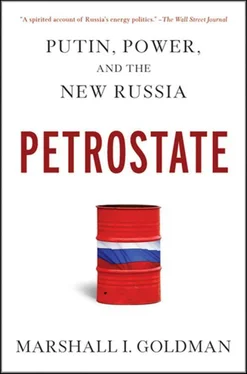With the 1918 British takeover and denationalization of the Baku oil fields, hopes in the European stock markets soared on the expectation that the weak Bolsheviks would never come back. Moving fast in hopes that it could establish a presence in the area where previously it had been weak, Standard Oil of New Jersey signed a contract in January 1919 with the independent government of Azerbaijan. 34It paid one-third of a million dollars for drilling sites. The Nobels toyed with the idea of selling their shares to the Anglo-Persian Oil Company but quickly grabbed yet another offer from Standard Oil. A tentative agreement was signed on April 12, 1920. Despite the fact that the Bolsheviks retook the area later that month and nationalized the region’s oil fields, Standard Oil remained convinced the Bolsheviks would not be able to hold on. Reflecting its confidence, it paid Nobel half a million dollars for some additional land. Ultimately Standard Oil paid Nobel several million dollars for its stock that had already become worthless. According to Robert Tolf, this Standard Oil purchase was later to constitute one-tenth of the entire American claim against the Bolsheviks for American property seized during the revolution. 35However, this speculative fever was not limited to Standard Oil. Shell Oil, along with other European investors, also bought what turned out to be worthless shares.
While the Soviets had gained physical control over the territory, they soon discovered that without the technical and managerial help of foreigners and others who had fled the area they could not really operate the oil fields. Output continued to fall until it reached a low in 1921 of 3.781 million tons, a level not seen since 1889. To add to their headaches, the Bolsheviks also found that the Western oil companies had united to boycott Russian oil exports, a pattern that was fairly common whenever oil fields were nationalized (these boycotts were usually only partially successful), at least until the late 1960s. 36Formed in mid-1922, the Front Uni represented an oil consortium of fifteen companies, all of which promised they would not buy Russian “illegally produced petroleum.” But because of Western greed and Russian connivance, the Front Uni’s embargo was broken even before it began to operate. Shell, itself a leader of the boycott, made a purchase of Russian oil in February 1923 and the French followed soon after. 37
The oil company embargo broke apart even earlier, particularly after it looked like Lenin had come to recognize that the nationalization of private property and the expulsion of foreign companies was a mistake. Acknowledging that they could not properly operate their newly nationalized oil fields, the Soviets began to solicit foreign help and the oil companies responded. Lenin personally approved such measures under the New Economic Policy (NEP), which authorized extending concessions for foreigners. One of the first to respond to the Soviet request for help was an American company, the Barnsdall Corporation. 38Signed in October 1921, the Barnsdall contract actually predates the embargo. This was an important breakthrough for the Soviet Union. Not only did Barnsdall help the USSR restore production but it also served to attract several other foreign companies, including British Petroleum, the Societa Minerere Italo Belge di Georgia, and eventually a Japanese group in Sakhalin. 39Once a breach had been made, the embargo failed.
The foreigners did what they were supposed to do. They restored the oil fields and started new ones. Barnsdall brought in advanced rotary drills and deep well pumps. Production rapidly recovered, and although there is some uncertainty as to how much Barnsdall made out of the venture, by 1924 when it left the Soviet Union, production was back up to 7 million tons. Production continued to increase, as did foreign technical help. Besides work at the wells, foreign help included American, German, and British assistance in the building of a second pipeline from Baku to Batumi, the French supply of a Schlumberger well-logging process, and American (Standard Oil of New York), German, and British support for refinery construction. 40
Once output had recovered, the Soviets began systematically to revoke their concessions. By December 1930 most of them had been closed out. Standard Oil, however, was allowed to retain its concession at the kerosene refinery built in Batumi until at least 1935 and the Japanese stayed on Sakhalin until 1944. 41But ultimately all foreign concessions were terminated.
At first glance it might seem that expelling foreign private companies was merely a response to traditional communist doctrine. But from the perspective of the post-communist Putin-era presidency, expelling foreign companies once Russia’s own companies have begun to prosper has become standard Russian practice. Certainly today Shell Oil and Exxon-Mobil would agree that the harassment they recently faced in 2006 designed to make them walk away from their several billion dollar operations off the island of Sakhalin is more a form of nationalist than communist pressure.
Soviet petroleum policy then, just like Russian policy today, is not consistent. Almost at the time the Soviets were closing down Standard Oil’s concession, they issued a new series of contracts. The critic Anthony Sutton records how companies such as Badger, Universal Oil Products, and Lummus were called back to rebuild and reconstruct refineries. 42Having been supported by wartime Lend Lease contracts, some of their work continued until 1945. With this help, production and exports rose rapidly. Because of the damages inflicted by the Germans in World War II, production fell from its 31 million tons record in 1940 to 22 million tons in 1946. But with foreign help, as Table Intro.1 shows, by 1949 they had established a new production record
Soviet Control Inside but Capitalist Outside
As production increased, so did the amount of administrative control emanating from Moscow. In the early days, however, there was more control in principle than in practice. Theoretically control over industry was centered in the Supreme Council of the National Economy (VSNKH), which was created shortly after the revolution in 1917. VSNKH in turn derived its power from the Council of People’s Commissars (CPK). 43The CPK (the forerunner of the Council of Ministers) also created the Chief Oil Committee (Glavny Neftianoi Komitet) under the VSNKH on May 17, 1918. But only a few months later the Turks and then the British pushed the Bolsheviks out of the Baku region.
Meaningful control by the Russian authorities had to wait until they sent the British and Turks home in the spring of 1920. Then, recognizing the communication problem between Moscow and the Caucasus, the Chief Oil Committee authorized the creation of three local operating trusts. Azneft, which apparently was the most efficient and aggressive of the three, took over control of the Baku region. Grozneft took over Grozny, and Embaneft took over the fields in the Emba area. 44The three trusts in 1922 formed a commercial syndicate, Neftesyndikat (later succeeded by Soiuzneft) to handle exports and other foreign activities. 45Neftesyndikat proved to be a very aggressive monopoly. It joined together in a fifty-fifty partnership in 1923 with the English firm Sale & Company to market oil in the United Kingdom. 46Neftesyndikat reserved the right to buy out all Sale & Company shares in ten years. This first British company was followed by the second. This time the partnership was between Neftesyndikat and Royal Dutch Shell. The Soviets also entered an arrangement with Standard Oil of New York to market Russian oil in the Near and Far East. They made other deals with British-Mexican Petroleum, Asiatic Petroleum, and Bell Petrole.
Читать дальше












